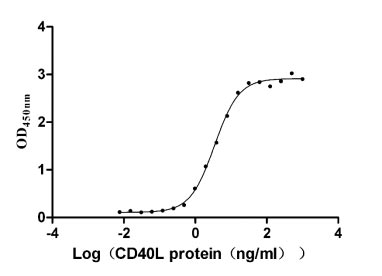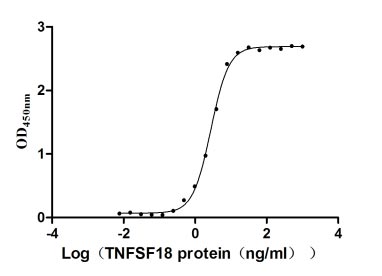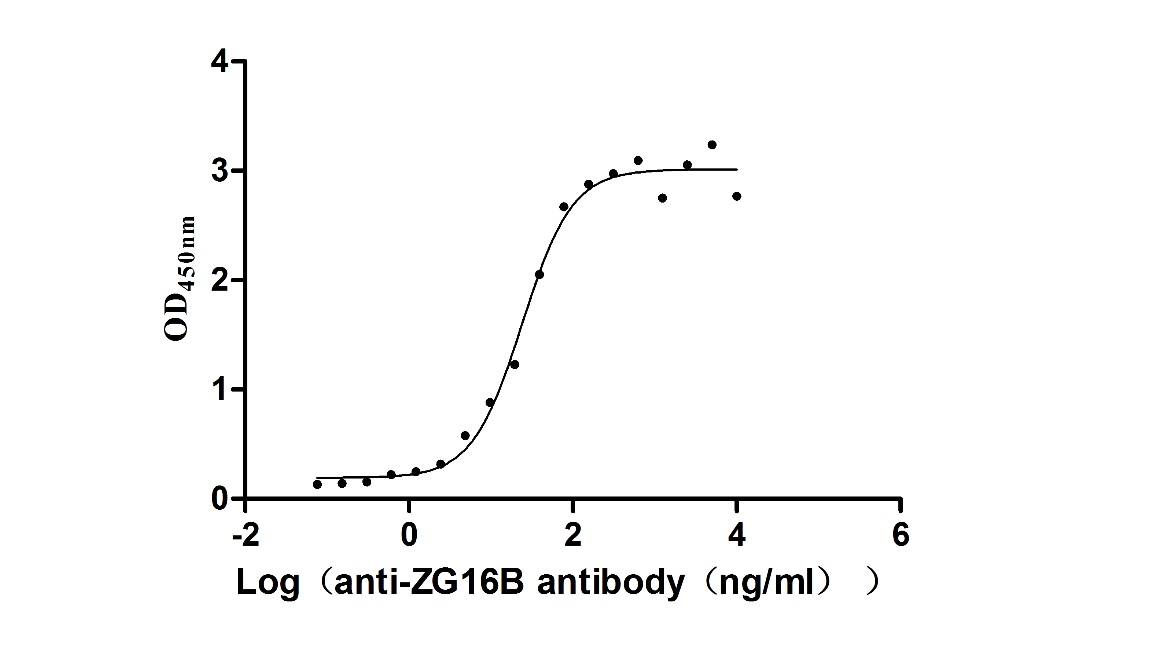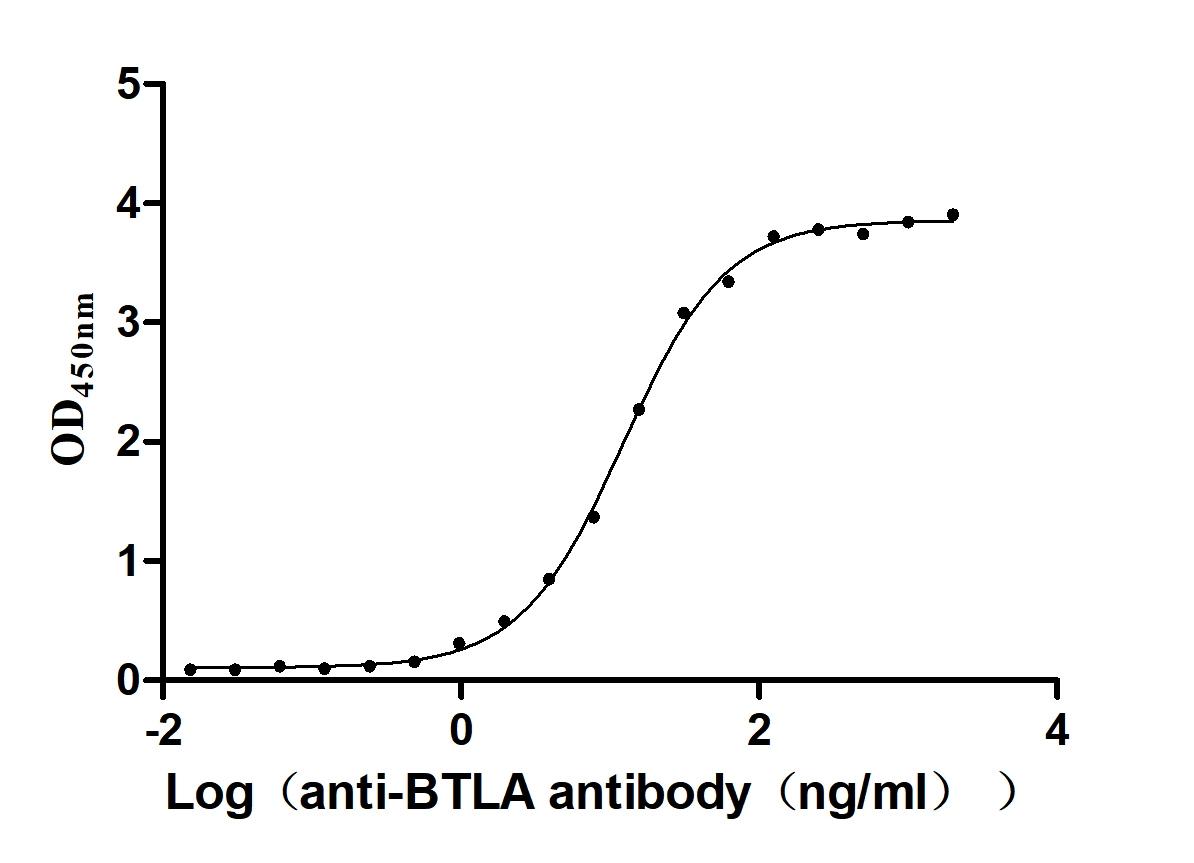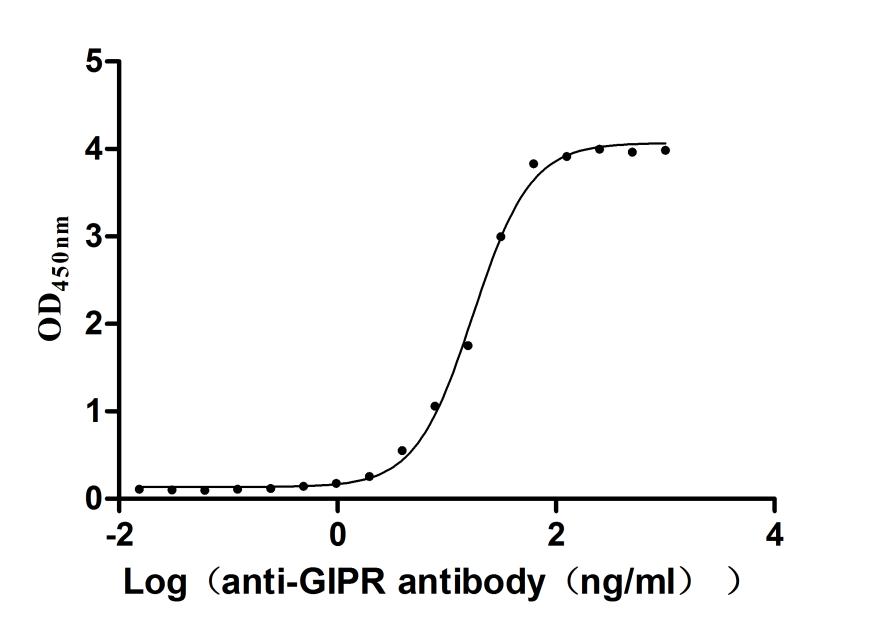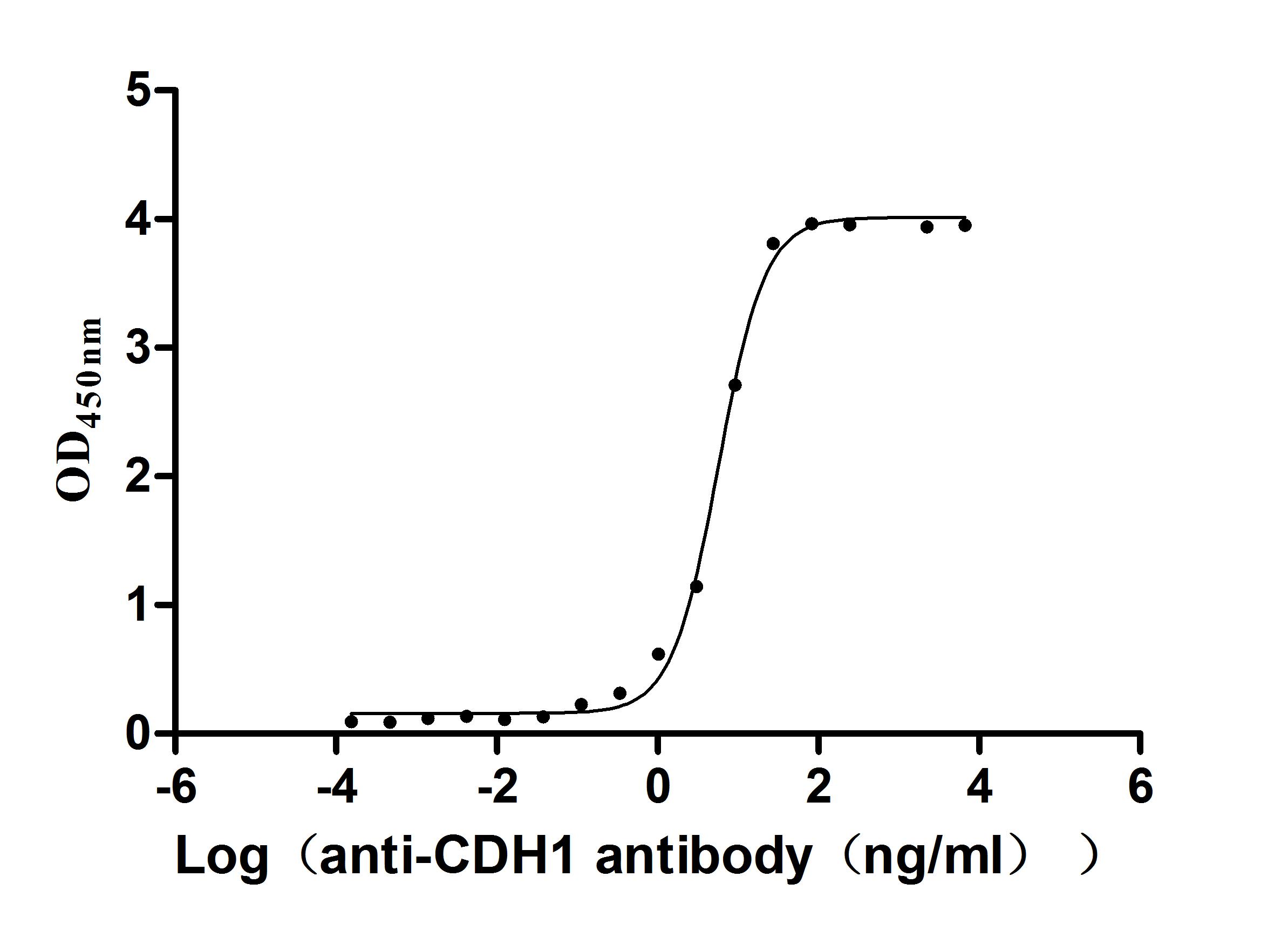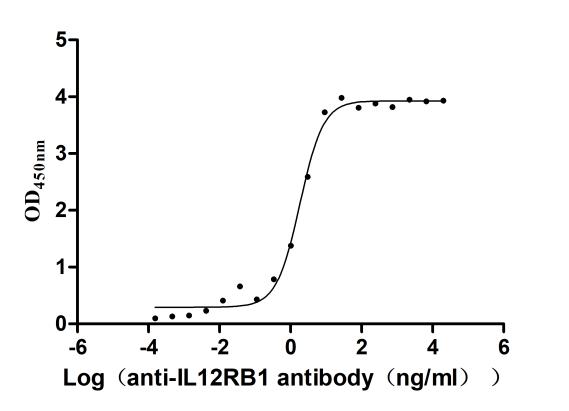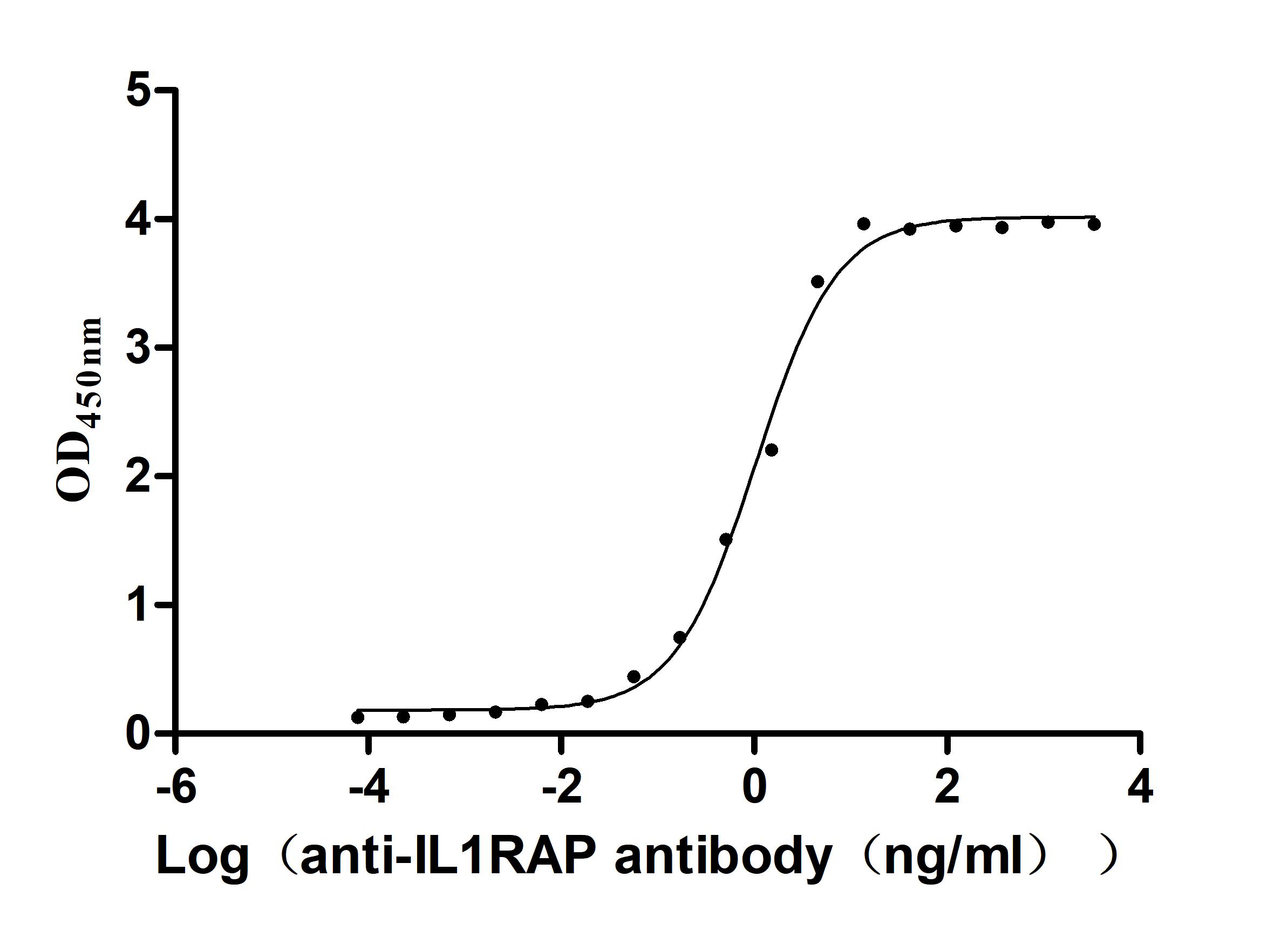Recombinant Human Heterogeneous nuclear ribonucleoprotein K (HNRNPK), partial
-
货号:CSB-YP010611HU
-
规格:
-
来源:Yeast
-
其他:
-
货号:CSB-EP010611HU-B
-
规格:
-
来源:E.coli
-
共轭:Avi-tag Biotinylated
E. coli biotin ligase (BirA) is highly specific in covalently attaching biotin to the 15 amino acid AviTag peptide. This recombinant protein was biotinylated in vivo by AviTag-BirA technology, which method is BriA catalyzes amide linkage between the biotin and the specific lysine of the AviTag.
-
其他:
-
货号:CSB-BP010611HU
-
规格:
-
来源:Baculovirus
-
其他:
-
货号:CSB-MP010611HU
-
规格:
-
来源:Mammalian cell
-
其他:
产品详情
-
纯度:>85% (SDS-PAGE)
-
基因名:HNRNPK
-
Uniprot No.:
-
别名:CSBP; dC stretch binding protein; FLJ41122; Heterogeneous nuclear ribonucleoprotein K; hnRNP K; HNRNPK; HNRPK; HNRPK_HUMAN; Transformation up regulated nuclear protein; Transformation up-regulated nuclear protein; Transformation upregulated nuclear protein; TUNP
-
种属:Homo sapiens (Human)
-
蛋白长度:Partial of Isoform 2
-
表达区域:3-464aa
-
氨基酸序列TEQPEETFPNTETNGEFGKRPAEDMEEEQAFKRSRNTDEMVELRILLQSKNAGAVIGKGGKNIKALRTDYNASVSVPDSSGPERILSISADIETIGEILKKIIPTLEEGLQLPSPTATSQLPLESDAVECLNYQHYKGSDFDCELRLLIHQSLAGGIIGVKGAKIKELRENTQTTIKLFQECCPHSTDRVVLIGGKPDRVVECIKIILDLISESPIKGRAQPYDPNFYDETYDYGGFTMMFDDRRGRPVGFPMRGRGGFDRMPPGRGGRPMPPSRRDYDDMSPRRGPPPPPPGRGGRGGSRARNLPLPPPPPPRGGDLMAYDRRGRPGDRYDGMVGFSADETWDSAIDTWSPSEWQMAYEPQGGSGYDYSYAGGRGSYGDLGGPIITTQVTIPKDLAGSIIGKGGQRIKQIRHESGASIKIDEPLEGSEDRIITITGTQDQIQNAQYLLQNSVKQYADVEGF
-
蛋白标签:Tag type will be determined during the manufacturing process.
The tag type will be determined during production process. If you have specified tag type, please tell us and we will develop the specified tag preferentially. -
产品提供形式:Lyophilized powder
Note: We will preferentially ship the format that we have in stock, however, if you have any special requirement for the format, please remark your requirement when placing the order, we will prepare according to your demand. -
复溶:We recommend that this vial be briefly centrifuged prior to opening to bring the contents to the bottom. Please reconstitute protein in deionized sterile water to a concentration of 0.1-1.0 mg/mL.We recommend to add 5-50% of glycerol (final concentration) and aliquot for long-term storage at -20℃/-80℃. Our default final concentration of glycerol is 50%. Customers could use it as reference.
-
储存条件:Store at -20°C/-80°C upon receipt, aliquoting is necessary for mutiple use. Avoid repeated freeze-thaw cycles.
-
保质期:The shelf life is related to many factors, storage state, buffer ingredients, storage temperature and the stability of the protein itself.
Generally, the shelf life of liquid form is 6 months at -20°C/-80°C. The shelf life of lyophilized form is 12 months at -20°C/-80°C. -
货期:Delivery time may differ from different purchasing way or location, please kindly consult your local distributors for specific delivery time.Note: All of our proteins are default shipped with normal blue ice packs, if you request to ship with dry ice, please communicate with us in advance and extra fees will be charged.
-
注意事项:Repeated freezing and thawing is not recommended. Store working aliquots at 4°C for up to one week.
-
Datasheet :Please contact us to get it.
相关产品
靶点详情
-
功能:One of the major pre-mRNA-binding proteins. Binds tenaciously to poly(C) sequences. Likely to play a role in the nuclear metabolism of hnRNAs, particularly for pre-mRNAs that contain cytidine-rich sequences. Can also bind poly(C) single-stranded DNA. Plays an important role in p53/TP53 response to DNA damage, acting at the level of both transcription activation and repression. When sumoylated, acts as a transcriptional coactivator of p53/TP53, playing a role in p21/CDKN1A and 14-3-3 sigma/SFN induction. As far as transcription repression is concerned, acts by interacting with long intergenic RNA p21 (lincRNA-p21), a non-coding RNA induced by p53/TP53. This interaction is necessary for the induction of apoptosis, but not cell cycle arrest.
-
基因功能参考文献:
- Data show that heterogeneous nuclear ribonucleoprotein K (hnRNP K) and influenza virus NS1A binding protein (NS1-BP) regulate host splicing events and that viral infection causes mis-splicing of some of these transcripts. PMID: 29921878
- Study findings underscore the biological significance of MRPL33-L and hnRNPK in the tumor formation and identifies hnRNPK as a critical splicing regulator of MRPL33 pre-mRNA in cancer cells. PMID: 28869607
- hnRNPK regulates PLK1 expression by competing with the PLK1-targeting miRNAs, miR-149-3p and miR-193b-5p. PMID: 28708135
- we discovered that hnRNPK plays an important role in bladder cancer, suggesting that it is a potential prognostic marker and a promising target for treating bladder cancer. PMID: 27862976
- The hnRNPK positively regulates the level of prostate tumor overexpressed 1-antisense 1 which harbors five binding sites for miR-1207-5p. The knockdown of hnRNPK or PTOV1-AS1 increased the enrichment of heme oxygenase-1 mRNA in miR-1207-5p-mediated miRNA-induced silencing complex and thus suppressed the expression of heme oxygenase-1. PMID: 28228215
- High HNRNPK expression is associated with pancreatic cancer. PMID: 28423622
- Down-regulation of DAB2IP correlated negatively with hnRNPK and MMP2 expressions in CRC tissues. In conclusion, our study elucidates a novel mechanism of the DAB2IP/hnRNPK/MMP2 axis in the regulation of CRC invasion and metastasis, which may be a potential therapeutic target. PMID: 28335083
- Tumor cells bearing a p53 mutation showed increased damage levels and delayed repair. Knockdown of hnRNPK applied simultaneously with irradiation reduced colony-forming ability and survival of tumor cells. Taken together, our data shows that hnRNPK is a relevant modifier of DNA damage repair and tumor cell survival. We therefore recommend further studies to evaluate the potential of hnRNPK as a drug target for improvement PMID: 28426877
- Data suggest that hnRNPK plays role in heat shock response of cells by regulating HSF1; hnRNPK inhibits HSF1 activity, resulting in reduced expression of HSP27 and HSP70 mRNAs; hnRNPK also down-regulates binding of HSF1 to heat shock response element. (hnRNPK = heterogeneous-nuclear ribonucleoprotein K; HSF1 = heat shock transcription factor 1; HSP = heat-shock protein) PMID: 28592492
- KRAS-mutant colorectal carcinoma shows intrinsic radioresistance along with rapid upregulation of hnRNP K in response to ionizing radiation that can effectively be targeted by MEK inhibition. PMID: 27793696
- Nujiangexathone A, a novel compound from Garcinia nujiangensis, down-regulates hnRNPK levels in cervical tumor cells, inducing cell cycle arrest. PMID: 27424288
- Our study also suggests that loss of function variants in HNRNPK should be considered as a molecular basis for patients with Kabuki-like syndrome PMID: 26954065
- these findings support a critical role for hnRNP K in the regulation of autophagy in drug-resistant leukemia cells, and this RNP is therefore a potential target of clinical drug-resistance treatment. PMID: 27155326
- hnRNP K is a multifunctional protein that can regulate both oncogenic and tumor suppressive pathways through a plethora of chromatin-, DNA-, RNA-, and protein-mediated activates, suggesting its aberrant expression may have broad-reaching cellular impacts. (Review) PMID: 27049467
- These results establish the role of hnRNP K and PCPB1 in the translational control of morphine-induced MOR expression in human neuroblastoma (NMB) cells as well as cells stably expressing MOR (NMB1). PMID: 27292014
- HnRNP K is a promising tissue biomarker for diagnosing gastric cancer. PMID: 27278897
- CASC11 can target heterogeneous ribonucleoprotein K (hnRNP-K) to activate WNT/beta-catenin signaling in colorectal cancer cells to promote tumor growth and metastasis. PMID: 27012187
- Data show that heterogeneous nuclear ribonucleoprotein K (hnRNPK) stabilized of cellular FLICE-inhibitory protein (c-FLIP) protein through inhibition of glycogen synthase kinase 3 beta (GSK3beta) Ser9 phosphorylation during the TNF-related aoptosis-inducing ligand (TRAIL)-induced apoptosis. PMID: 26972480
- HhnRNP-K-mediated regulation of NMHC IIA mRNA translation contributes to the control of enucleation in erythropoiesis. PMID: 26823606
- hnRNP K binds miR-122, a mature liver-specific microRNA required for Hepatitis C virus replication. PMID: 26330540
- The s identified two new human proteins that interact with Ehrlichia chaffeensis EtpE-C: CD147 and heterogeneous nuclear ribonucleoprotein K (hnRNP-K). PMID: 26530384
- Data show that proto-oncogene protein c-myc is upregulated by sumoylated heterogeneous nuclear ribonucleoprotein K (hnRNP K) at the translational level in Burkitt's lymphoma cells. PMID: 26317903
- hnRNP K may be a key molecule involved in cell motility in RCC cells PMID: 26713736
- It describes the identification of heterogeneous nuclear ribonucleoprotein K (hnRNPK) as one of the composite element binding factors(CEBF) that acts as transactivator of PXR promoter. PMID: 26586566
- RTVP-1 regulates glioma cell spreading, migration and invasion and that these effects are mediated via interaction with N-WASP and by interfering with the inhibitory effect of hnRNPK on the function of this protein. PMID: 26305187
- we investigate the role of hnRNP K in the radioresistance of malignant melanoma cells PMID: 26136337
- These results indicate that dengue virus type 2 and Junin virus induce hnRNP K cytoplasmic translocation to favor viral multiplication. PMID: 25865411
- Data implicate hnRNPK in the development of hematological disorders and suggest hnRNPK acts as a tumor suppressor. PMID: 26412324
- Inhibition of CDK2 phosphorylation blocked phosphorylation of hnRNP K, preventing its incorporation into stress granules (SGs). Due to interaction between hnRNP K with TDP-43, the loss of hnRNP K from SGs prevented accumulation of TDP-43. PMID: 25410660
- HNRNPK might determine efficiency of Hepatitis C virus particle production by limiting the availability of viral RNA for incorporation into virions. PMID: 25569684
- Data indicate that twenty proteins were identified as binding partners of the primary activating element in the heterogeneous nuclear ribonucleoprotein K (hnRNP K) promoter. PMID: 25497182
- hnRNP K interacts with EV71 5' UTR, which is required for efficient synthesis of viral RNA.[review] PMID: 26164948
- hnRNPK is potentially implicated in the radiogenic response of HNSCC. PMID: 25281771
- hnRNP K plays an important role in the mitotic process in colon cancer cells.hnRNP K upregulates NUF2 and promotes the tumorigenicity of colon cancer cells. PMID: 25701787
- These findings functionally integrate K17, hnRNP K, and gene expression along with RSK and CXCR3 signaling in a keratinocyte-autonomous axis and provide a potential basis for their implication in tumorigenesis PMID: 25713416
- HnRNP K can induce MMP12 expression and enzyme activity through activating MMP12 promoter, which promotes cell migration and invasion in nasopharyngeal carcinoma cells. PMID: 24885469
- Results indicate that the interaction between the AR and hnRNP K has an important role in the progression of prostate cancer. PMID: 24626777
- hnRNP K and PU.1 act synergistically during granulocytic differentiation, hnRNP K seems to have a negative effect on PU.1 activity during monocytic maturation PMID: 25005557
- CNBP overexpression caused increase of cell death and suppression of cell metastasis through its induction of G-quadruplex formation in the promoter of hnRNP K resulting in hnRNP K down-regulation PMID: 24594223
- Data show that SET accumulation up-regulated hnRNPK mRNA and total/phosphorylated protein, promoted hnRNPK nuclear location, and reduced Bcl-x mRNA levels. PMID: 24508256
- NS1-BP-hnRNPK complex is a key mediator of influenza A virus gene expression. PMID: 23825951
- These studies demonstrate hnRNP K to be a multifunctional protein that supports vesicular stomatitis virus infection via its role(s) in suppressing apoptosis of infected cells. PMID: 23843646
- hnRNPK may play a role in recruitment of XRN2 to gene loci thus regulating coupling 3'-end pre-mRNA processing to transcription termination. PMID: 23857582
- heterogeneous nuclear ribonucleoprotein K (hnRNPK), a protein known to integrate multiple signal transduction pathways with gene expression, as a SERT distal polyadenylation element binding protein PMID: 23798440
- Prolonged downregulation of hnRNP K using small interfering RNA significantly decreased cell viability and increased apoptosis in HCC cell lines in a p53-independent manner. PMID: 23455382
- Caspase-3 cleaves hnRNP K in erythroid differentiation. PMID: 23519117
- HnRNP K controlled expression of IE2 protein of Human cytomegalovirus during viral replication. PMID: 23099853
- hnRNP-K regulates extracellular matrix, cell motility, and angiogenesis pathways. Involvement of the selected genes (Cck, Mmp-3, Ptgs2, and Ctgf) and pathways was validated by gene-specific expression analysis PMID: 23564449
- ATM-dependent phosphorylation of heterogeneous nuclear ribonucleoprotein K promotes p53 transcriptional activation in response to DNA damage. PMID: 23343766
- SUMO modification plays a crucial role in the control of hnRNP-K's function as a p53 co-activator in response to DNA damage by UV PMID: 23092970
显示更多
收起更多
-
相关疾病:Au-Kline syndrome (AUKS)
-
亚细胞定位:Cytoplasm. Nucleus, nucleoplasm. Cell projection, podosome. Note=Recruited to p53/TP53-responsive promoters, in the presence of functional p53/TP53 (PubMed:16360036). In case of ASFV infection, there is a shift in the localization which becomes predominantly nuclear (PubMed:18775702).
-
数据库链接:
HGNC: 5044
OMIM: 600712
KEGG: hsa:3190
STRING: 9606.ENSP00000365439
UniGene: Hs.522257
Most popular with customers
-
Recombinant Human Tumor necrosis factor receptor superfamily member 5 (CD40), partial (Active)
Express system: Mammalian cell
Species: Homo sapiens (Human)
-
Recombinant Human Tumor necrosis factor ligand superfamily member 18 (TNFSF18), partial (Active)
Express system: Mammalian cell
Species: Homo sapiens (Human)
-
Recombinant Macaca fascicularis zymogen granule protein 16 homolog B (ZG16B) (Active)
Express system: Mammalian cell
Species: Macaca fascicularis (Crab-eating macaque) (Cynomolgus monkey)
-
Recombinant Human B- and T-lymphocyte attenuator(BTLA), partial (Active)
Express system: Mammalian cell
Species: Homo sapiens (Human)
-
Recombinant Human Gastric inhibitory polypeptide receptor(GIPR),partial (Active)
Express system: Mammalian cell
Species: Homo sapiens (Human)
-
Recombinant Human Cadherin-1(CDH1),partial (Active)
Express system: Mammalian cell
Species: Homo sapiens (Human)
-
Recombinant Human Interleukin-12 receptor subunit beta-1(IL12RB1),partial (Active)
Express system: Mammalian cell
Species: Homo sapiens (Human)
-
Recombinant Macaca fascicularis Interleukin 1 receptor accessory protein(IL1RAP), partial (Active)
Express system: Mammalian cell
Species: Macaca fascicularis (Crab-eating macaque) (Cynomolgus monkey)


